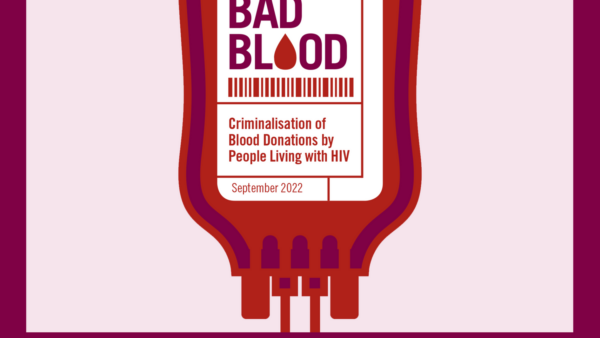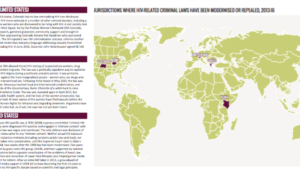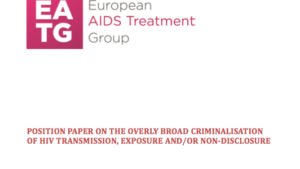Overview
Greece does not have an HIV-specific provision but other laws in the Penal Code have been applied to cases of perceived HIV ‘exposure’ or transmission.
Article 285 of the Penal Code criminalises violations of disease prevention measures issued by competent authorities or under the law with a penalty of up to three years’ imprisonment and/or a fine, increased to up to ten years’ imprisonment if transmission occurs. These penalties are increased to a minimum of ten years’ to life imprisonment if death results. Lower penalties apply if the violation arises out of negligence.
Additionally, harm provisions in the Penal Code found in sections 308-314 have also been used in HIV cases. In particular, section 309 allows a penalty of up to three years’ imprisonment to be imposed for physical harm resulting in ‘life-threatening’ or ‘serious personal injuries’, while section 310 imposes a penalty of at least one year if ‘serious bodily harm’ is caused, which is defined to include a ‘serious and long-term illness’, which can be increased to up to ten years’ imprisonment if intent is present. Further provisions govern the penalties where death results or other aggravating factors are present, while section 314 covers physical injury through negligence.
At least thirty four people have been prosecuted in relation to HIV. In the first known case in 2010, it was reported that a Thessaloniki court reportedly found a man guilty of ‘bodily injury through serial negligence’ and ‘violation of measures imposed by the authority responsible for the spread of disease from deliberate negligence’ because he unknowingly donated HIV-positive blood which then resulted in HIV transmission to several blood recipients. The man, who was undiagnosed at the time he gave the blood donation, was found to be culpable because he had not disclosed that he had previously had sex with a sex worker. He was sentenced to 33 months’ imprisonment, suspended for three years (see our report, Bad Blood, for a global analysis of the criminalisation of blood donations).
A majority of known cases resulted to a notorious 2012 crackdown in which almost 100 women were arrested after the health minister called for the criminalisation of condomless sex with sex workers. Notably, sex work is legal and regulated in Greece, with registration and medical screenings required. The women were detained by police, forcibly HIV tested, and the 32 women who tested HIV-positive were charged under general harm provisions for alleged transmission or ‘exposure’, imprisoned, and had their names published in an apparent effort to protect public health. Although all of the women who had been charged with intentionally infecting people while allegedly working as sex workers were released or acquitted by May 2017, this came at a huge personal cost to the women who had always maintained their innocence; three of whom died before their case was concluded. As such, a case was lodged before the European Court of Human Rights, which in January 2024 – 12 years after the crackdown – ruled that the women’s rights to privacy (Article 8) were violated both by the forcible HIV testing and the publication of their data.
The case had hinged on Public Health Decree 39A (2012) which allowed police to detain and forcibly test people suspected of being HIV-positive, which could then facilitate quarantine, arrest and deportation of ‘illegal’ migrants. The law was strenuously opposed by scientists and human rights advocates, leading to its eventual repeal in April 2015.
A more recent case, the courts demonstrated an ability to consider transmission risk factors when determining liability for ‘exposure’. In this case, an HIV-positive man was charged with attempting to cause bodily injury and attempting to cause serious bodily injury with deception on the grounds that he did not use a condom during sex with a woman with whom he had an occasional sexual relationship. Supported by the Greek community organisation, Centre for Life, the case introduced scientific evidence regarding the accused’s sustained undetectable viral load as a result of effective treatment. The 2nd Joint Court of Athens found that given the scientific evidence on transmission risk, the charges were not met, finding the man not guilty. This is the first Greek case where a court has explicitly adopted scientific evidence regarding effective treatment and HIV transmission risk.
Laws
Penal Code
Article 285. Violation of disease prevention measures
1. Whoever violates the measures ordered by the law or the competent authority to prevent the invasion or spread of a contagious disease is punished: a) by imprisonment for up to three years or a fine if the act may result in a common danger to animals, b) with imprisonment and a fine if the act may result in a risk of transmission of the disease to an indefinite number of people.
2. If the violation resulted in the disease being transmitted to animals, imprisonment of at least three years and a fine is imposed, and if it resulted in transmission to humans, imprisonment of up to ten years is imposed.
3. If the violation resulted in the death of another, a minimum of ten years’ imprisonment is imposed, and if the death of a large number of people was caused, the court may impose life imprisonment.
4. Whoever, in the cases of paragraph 1, violates the measures through negligence, shall be punished: a) in the case of element a) by a monetary penalty or community service and b) in the case of element b) by imprisonment of up to two years or a monetary penalty.
Penal Code
Section 308. Physical harm
1. Anyone who causes bodily injury or damage to another’s health is punished by imprisonment for up to two years or a fine. If the injury or health damage caused to him is completely minor, he is punished by providing community service.
(…)
3. The bodily harm referred to in paragraph 1 is not unjust, when it is attempted with the consent of the victim and does not offend good morals.
(…)
Section 309. Dangerous bodily harm
If the action in the preceding article was carried out in a manner that could cause life-threatening injury or serious personal injury, imprisonment of up to three years or a fine may be imposed.
Section 310. Severe bodily harm
1. Whoever causes serious bodily harm to another shall be punished by imprisonment of at least one year. If he sought to cause grievous bodily harm, he is punished by imprisonment for up to ten years.
2. Serious bodily harm exists in particular if the act caused the sufferer a life-threatening or serious and long-term illness or serious mutilation, or if it significantly and for a long time prevented him from using his body or mind.
Section 311. Fatal bodily harm
If the physical injury resulted in the death of the victim, imprisonment for up to ten years is imposed. If the culprit intended to seriously injure the victim, imprisonment is imposed.
Section 312. Physical harm to weak people (sic)
1. Whoever causes physical injury or harm to health to a minor or to a person who cannot defend himself, as long as these persons are under the custody or protection of the offender based on law, court decision or actual situation, cohabit with the offender or have a work or service relationship with him, shall be punished: a) for the act of article 308 par. 1 subsection a’, with imprisonment of at least one year, b) for the act of article 309, with imprisonment of at least two years, c) for the act of article 310 par. 1 sec. a’, with imprisonment of at least three years and if he sought to cause grievous bodily harm, with imprisonment and d) for the act of article 311, with imprisonment.
2. The same penalties are imposed when the act is committed against a spouse during marriage or against a partner during cohabitation.
The performance of the act at the expense of a pregnant woman constitutes an aggravating circumstance.
3. With causing bodily harm to a minor according to paragraph 1 item a’, the performance of the acts of the previous paragraphs in front of a minor is equated.
4. The infliction of bodily harm in accordance with paragraph 1, point c) is equated with the methodical infliction of intense physical pain or physical exhaustion dangerous to health, or mental pain capable of causing serious mental harm, in particular with prolonged isolation at the expense of the persons first paragraph.
(…)
Section 314. Personal injury due to negligence
1. Anyone who negligently causes physical injury or damage to the health of another is punished by community service or a fine or imprisonment for up to two years. If the bodily harm caused is completely minor, community service or a fine is imposed.
2. For the criminal prosecution of the act of the previous paragraph, a summons is required. The prosecution is ex officio if the culprit was a driver of a vehicle or obliged by reason of his service or profession to pay particular care or attention. When the guilty driver of a vehicle does not transport passengers or things for the purpose of earning a living, the criminal prosecution is carried out ex officio, but the public prosecutor by order abstains from the criminal prosecution if the victim declares that he does not wish the criminal prosecution of the perpetrator. If the statement is submitted after criminal proceedings have been instituted, the court will definitively suspend it.
Ministerial Decision GY.39a/2012 - Official Gazette B-1002/2-4-2012
Article 1. Infectious diseases and control
(…)
3. In particular, an obligation is imposed in principle for a health examination and, in case of hospitalization and therapeutic treatment, even directly supervised treatment where there is evidence of persons suffering from the diseases of the two previous paragraphs. Also, on indications of isolation, a restrictive quarantine is imposed in accordance with the provisions in paragraph 2 b hereof.
(…)
Article 4. Sanctions
Violators of the provisions herein shall be punished according to the provisions of article 43 par. 8 and 9 of Law 4025/2011.
Further resources
Our thanks to Centre for Life for their assistance confirming facts and current relevant legislation.
HIV Justice Network's Positive Destinations
Visit the Greece page on Positive Destinations for information on regulations that restrict entry, stay, and residency based on HIV-positive status, as well as access to HIV treatment for non-nationals.






